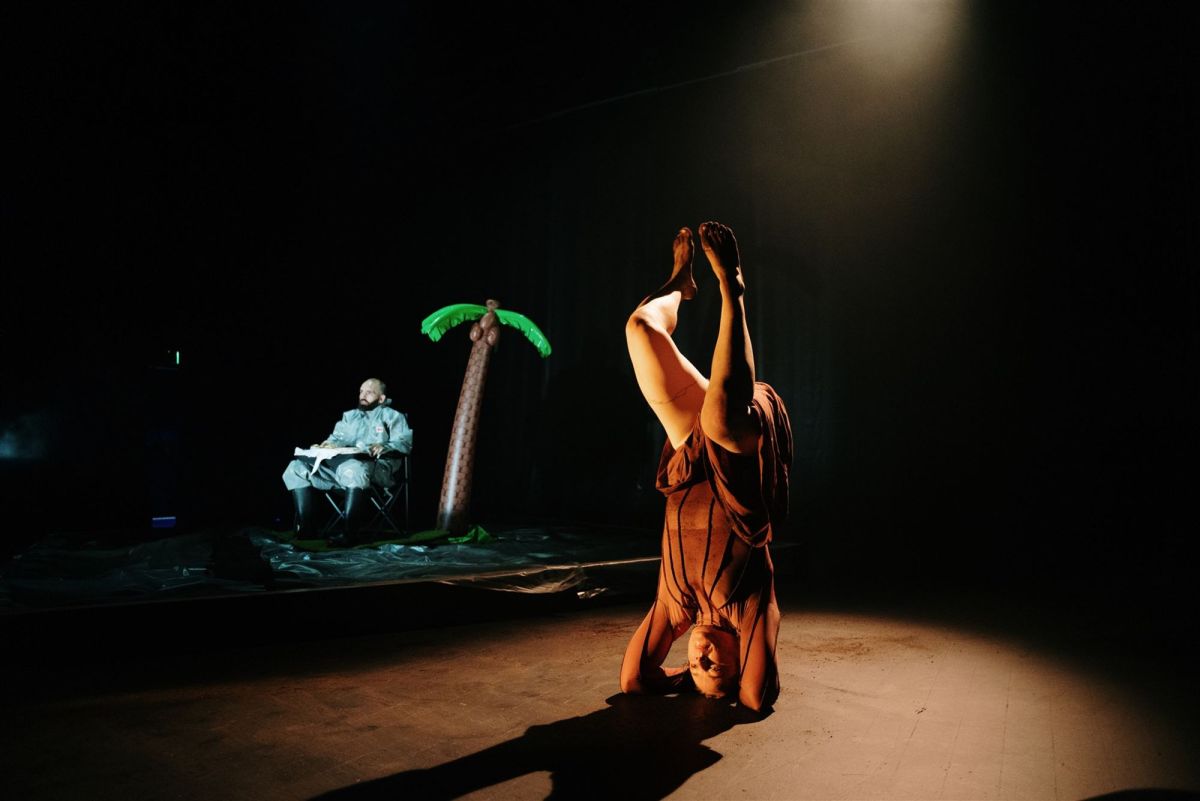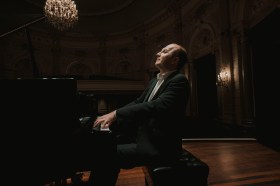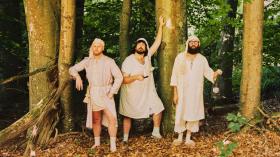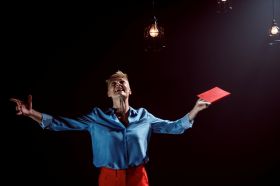Development of a new strategic plan for the Tasmanian theatre sector, including an ambitious, decade-long roadmap, is now underway in Tasmania.
The project is supported by $150,000 funding from Arts Tasmania through the one-off Strategic initiatives and service organisations 2024-2025 fund (which also included a grant towards developing and delivering a Hobart Readers and Writers Festival), and is being steered by a newly formed collective: the Tasmanian Live Performance Exchange – aka ‘the Exchange’.
Tasmanian Live Performance Exchange: quick links
What is the Tasmanian Live Performance Exchange?
The Exchange’s initial membership consists of eight companies, organisations and individuals from Launceston and Hobart: Mudlark Theatre Company, Assembly 197, Theatre North (Launceston’s Princess Theatre and Earl Arts Centre), contemporary circus company Rooke, Terrapin Puppet Theatre, Performing Lines Tasmania, Hobart’s Theatre Royal and theatre director and writer Dr Jane Woolard, Coordinator Theatre and Performance in the School of Creative Arts and Media, and Senior Lecturer in Theatre at the University of Tasmania.
The new performing arts plan will be developed by the sector, for the sector, and presents Tasmania’s arts sector with an opportunity for potentially radical new models of theatre-making.
‘We have a really unique opportunity here to reimagine how these companies, presenting houses and the training pathways, how they can all intersect to make something that is really enduring,’ explains Stuart Loone, Program Manager at Theatre North.
‘I think in the past, there’s been a sense of us lacking a state theatre company which has a remit not dissimilar to every other state theatre company, [and which would] kind of lead that and drive [such strategic thinking]. I think what we’re seeing now, with the range of companies that are operating quite successfully here, despite chronic underfunding … is a coalition of those companies. It will start a really, really interesting conversation about what the future of theatre in Lutruwita [Tasmania] will look like,’ he tells ArtsHub.
Read: Junction Arts Festival’s 2025 program celebrates Launceston culture
Belinda Kelly, Terrapin’s CEO/Executive Producer, says it’s possible the Exchange’s strategic plan will encompass more than just the theatre sector specifically.
‘I would say the group is concerned about … the wider performing arts and how they interconnect, and that includes, obviously, circus and dance,’ Kelly says, adding that the collective’s structure is also open to change.
‘We’re not pre-empting even the governance structure of the Exchange, going forward – it might be a vehicle to deliver or leverage some sort of partnerships and training opportunities and also advocacy towards government. But it could also be a fairly flexible site of activity. [We’re] not pre-empting [anything] because we don’t want to close it down in our minds,’ she explains.
Why Tasmania’s theatre sector needs a new strategic plan
Ten years ago, ArtsHub published a feature exploring Tasmania’s unique theatre ecology, detailing the ways professional and amateur productions shared relatively equal footing, and how directors, lighting designers and other creatives moved easily and without stigma between the two theatre streams.
In the intervening decade, the state’s professional theatre sector has retracted significantly. Loud Mouth Theatre Co. fell silent in 2017, the Tasmanian Theatre Company closed its doors in 2022, and Blue Cow Theatre wound up its operations in December 2023.
Currently, Launceston’s Mudlark Theatre is the only text-based theatre company to receive ongoing funding from Arts Tasmania, receiving $200,000 for the delivery of its annual 2025 program in the last Arts organisations – annual programs 2024-25 round. Rooke received a similar amount ($199,931) for its circus programs in 2025, while dance companies Stompin ($100,000), Mature Artists Dance Experience Inc ($100,000) and DRILL Performance Company ($100,000) were also supported.
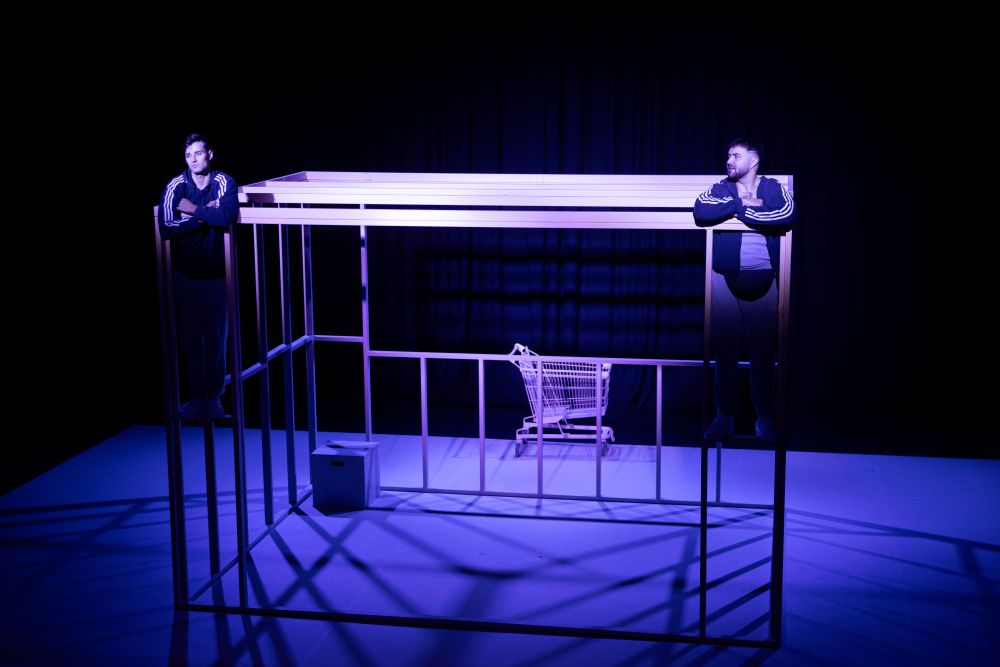
Terrapin receives more significant and stable funding, but it is a special case, having joined the National Performing Arts Partnership Framework (NPAPF) in 2021. Consequently, Terrapin receives ongoing funding of $250,000 a year from Arts Tasmania and $703,930 per year from Creative Australia from 2025 onwards.
Tasmania’s small tax base – the island state’s population was estimated at 574,705 people as of 30 December 2023, according to figures from the Australian Bureau of Statistics shared by Tasmania’s Department of State Growth – means fewer funding dollars are available for Arts Tasmania to distribute, but there are other factors at play that significantly impact Tasmania’s performing arts landscape.
‘In the performing arts or theatre sector, the systems of touring networks have really failed, and I feel that we’re in still in a lag effect of really experiencing that failure,’ Kelly says.
Clearly, the liquidation of Critical Stages Touring in 2023 has had a significant impact on the touring sector nationally, the ramifications of which are only now becoming clear. The ongoing exodus of skilled professionals from the sector, coupled with the challenges of choked supply chain pipelines, rising production costs, and ticket-buyers’ constrained and tightened budgets are further impacting the arts sector in Tasmania and indeed Australia-wide.
‘Interestingly, in Tasmania, in a way we’ve experienced [those challenges] before some of the mainland, I think, with the … the closure of some theatre companies. And at the same time, you’re seeing the flourishing of some of the [local] companies as well. Good examples of that would be Rooke and Mudlark and certainly Terrapin, which … have managed to find a way through,’ Kelly explains.
The new strategic plan to be developed by the Exchange will be a way to, ‘reimagine the relationship between producing companies or venues and audiences, and how we can be way more relevant to community. I think we already are being regionally based, but we’re looking to create, explore and iterate with new models,’ she says.
What might the 10-year roadmap look like?
Loone says it’s too early to speculate what the Exchange’s recommendations will be. ‘One of the great opportunities about having a sector plan that’s got a 10 year horizon, I think, will be viewing it through an external lens from people who aren’t working day to day on the ground in Tassie. That will be really, really important. I mean, Tasmania’s got a fairly unique set of circumstances going on. The state’s total population is that of a mid-sized city. It’s highly dispersed. So there are some sort of baked-in things we can’t change. So how do we best work with those things rather than trying to centralise too much?’
‘It’s also a really good opportunity to talk to Government and be really frank about what the challenges, the deep challenges, are right now,’ he says.
Arts Tasmania are expecting ‘a big ask’ to come out of the strategic plan, suggesting the Exchange has a rare opportunity to be bold and ambitious when it comes time to table their report, Kelly adds.
‘It is an awesome opportunity – a way to think really big and [in] a more radical way, not [following] these existing funding streams or initiatives. And when we were [previously] meeting with Arts Tasmania, we can see that they’re definitely in a more traditional way of thinking about this and what this work might be, but at the same time, they’re not stopping us from proceeding as we would like to, which is in a more exploded fashion,’ she explains.
Read: The Unconformity: anything but usual – the intimate festival changing how we engage
Loone continues: ‘And I think because the different layers of theatre and performance in Tasmania are so closely connected, we’ve also got an opportunity through this work to do a lot of learning from the ways that non-subsidised parts of the sector are working … We don’t have the answers, but we’re really, really open to exploring pretty much everything through this process.’
Next steps for the Tasmanian Live Performance Exchange
Kelly suggests the Exchange might examine ways to create, ‘more viable career pathways, hybrid contracts, shared jobs, all that sort of thing that we can do in a smaller ecosystem, because we’re all connected.’
She adds: ‘And I would say of the opportunity here, we have a rare window, because … everyone is like, simpatico and really open [and] vulnerable about that. This way it feels like there’s no [competition]. Everyone’s got their own interests for their company, but I feel like there’s a really collegiate approach going on here.’
The Exchange has just released an EOI about its collective intentions; its next step is to appoint a consultant to work with them in developing the industry-led 10-year plan.
Once the Tasmanian Live Performance Exchange’s 10-year strategic plan for the Tasmanian performing arts sector has been written up, the report will be submitted to Arts Tasmania and also to Cabinet.
‘We’d be looking to be delivering something to Government at the end of this financial year,’ Loone notes – i.e. in late June 2026.
Contemplating what lies ahead, he says: ‘What I’m really excited for with the Exchange, is to learn what the organisation could be through the sector plan – like, what is it that Tasmania needs? What is it that our sector needs into the future in terms of serviced organisational support? I don’t think we’ve got all the answers to that yet. I think we’re asking the right questions though.’
